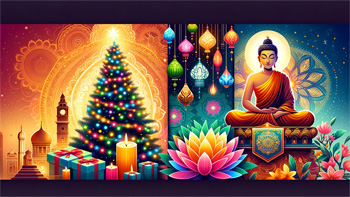Religious holidays and festivals hold a special place in the hearts of people all around the world. These events are not just a time for celebration and joy, but also a profound period for reflection, prayer, and community bonding. Each religion has its own set of holidays and festivals, each with unique customs, traditions, and significance. This article explores the major religious holidays and festivals across various faiths, including Christian, Islamic, Hindu, Buddhist, Jewish, Sikh, and Jain traditions. Understanding these celebrations can foster a greater appreciation for the diverse tapestry of faith and culture that enriches our global community.
Christian Holidays and Festivals
Christianity, with its rich history and widespread following, celebrates numerous holidays that commemorate the life and teachings of Jesus Christ. Christmas, marking the birth of Jesus, is perhaps the most universally recognized, enveloping the world in a festive spirit with its message of love and peace. Easter, another cornerstone of Christian faith, celebrates the resurrection of Jesus and offers a message of hope and renewal. Other significant observances include Lent, a period of reflection and penance leading up to Easter, and Pentecost, which commemorates the descent of the Holy Spirit upon the apostles. Each of these holidays is observed with distinct traditions, church services, and community gatherings that reflect the profound spiritual meaning and historical roots of the faith.
Islamic Holidays and Festivals
Islam follows a lunar calendar, and its two major holidays are Eid al-Fitr and Eid al-Adha. Eid al-Fitr, also known as the Festival of Breaking the Fast, marks the end of Ramadan, the holy month of fasting. It is a time of joyous family gatherings, feasting, and giving to the needy. Eid al-Adha, or the Festival of Sacrifice, commemorates the willingness of Ibrahim (Abraham) to sacrifice his son in obedience to God's command. It is observed with the ritual sacrifice of an animal, the meat of which is shared with the poor. Both Eids emphasize community solidarity, charity, and spiritual rejuvenation.
Hindu Holidays and Festivals
Hinduism, one of the oldest religions in the world, celebrates a myriad of festivals, each rich in mythology and tradition. Diwali, the Festival of Lights, symbolizes the victory of light over darkness and good over evil, celebrated with fireworks, lamps, and sweets. Holi, the Festival of Colors, marks the arrival of spring and the victory of good over evil, celebrated by throwing colored powders and water on one another. Navaratri, a nine-night festival, honors the Goddess Durga and her victory over the buffalo demon Mahishasura. These festivals, along with many others, reflect the diverse and vibrant tapestry of Hindu culture and spirituality.
Buddhist Holidays and Festivals
Buddhism, with its emphasis on enlightenment and compassion, observes several holidays that reflect the teachings of Buddha. Vesak, also known as Buddha Day, is the most significant, celebrating the birth, enlightenment, and death (Parinirvana) of Buddha. It is a time for meditation, reflection, and acts of kindness. Other important Buddhist festivals include Losar, the Tibetan New Year, which marks the beginning of a new year with rituals, dancing, and singing, and Ullambana (Obon in Japan), a time to honor and express gratitude to one's ancestors. These occasions offer Buddhists and others an opportunity to reflect on the values of compassion, peace, and wisdom.
Jewish Holidays and Festivals
Judaism celebrates a rich array of holidays that commemorate historical events and spiritual principles. Passover, one of the most important, remembers the liberation of the Israelites from Egyptian slavery, observed with the Seder meal and the retelling of the Exodus story. Rosh Hashanah, the Jewish New Year, and Yom Kippur, the Day of Atonement, form the High Holy Days, a time for reflection, repentance, and renewal. Hanukkah, the Festival of Lights, celebrates the rededication of the Second Temple in Jerusalem and is marked by lighting the menorah, playing dreidel, and eating traditional foods. These holidays embody the themes of freedom, faith, and reflection that are central to Jewish life.
Sikh Holidays and Festivals
Sikhism, a religion founded in the Punjab region of India, celebrates festivals that emphasize its spiritual and martial traditions. Vaisakhi, one of the most significant, marks the foundation of the Khalsa, a collective body of initiated Sikhs, by Guru Gobind Singh in 1699. It is celebrated with parades, singing, and the performance of martial arts (Gatka). Guru Nanak Gurpurab commemorates the birth of Guru Nanak, the founder of Sikhism, with prayer, community meals (langar), and hymns. These celebrations reflect the values of community service, equality, and devotion that are at the heart of Sikhism.
Jain Holidays and Festivals
Jainism, an ancient Indian religion that emphasizes non-violence and asceticism, observes festivals that highlight its core teachings and values. Mahavir Jayanti celebrates the birth of Mahavira, the last Tirthankara (spiritual teacher), with prayers, processions, and charitable acts. Paryushana, the most important Jain festival, is a time for fasting, introspection, and seeking forgiveness. It culminates in Samvatsari, a day for seeking forgiveness from all beings for any harm caused, knowingly or unknowingly. These practices reflect the Jain principles of ahimsa (non-violence), self-discipline, and respect for all forms of life.
Understanding the religious holidays and festivals of different faiths offers a window into the spiritual practices, values, and traditions that shape the lives of millions around the world. These celebrations not only provide a sense of belonging and identity within religious communities but also offer opportunities for interfaith understanding and mutual respect. By recognizing and appreciating the rich diversity of religious observances, we can foster a more inclusive and compassionate world.
